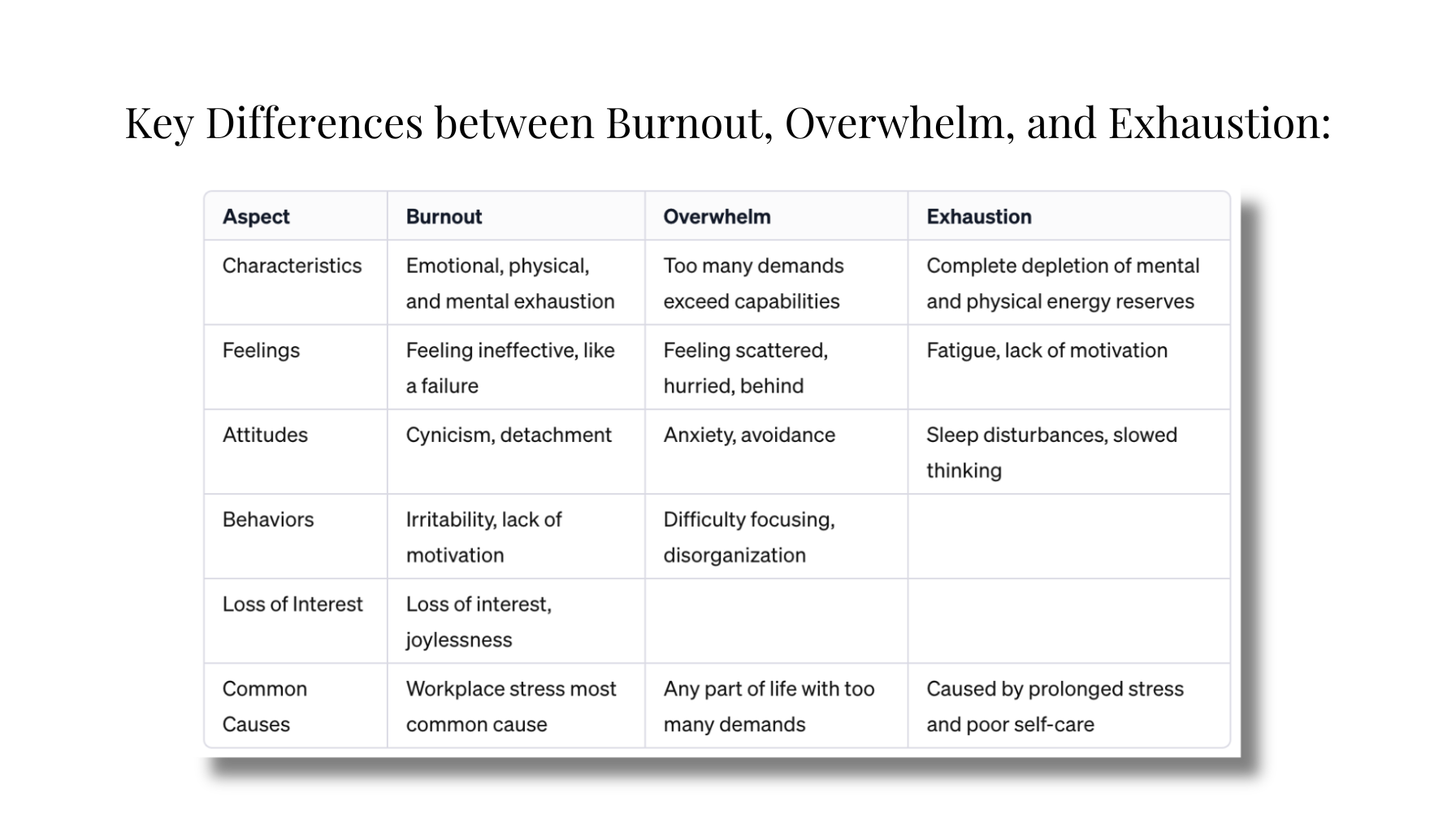Stress is an inevitable part of life. But when stress becomes chronic, it can have serious consequences for our health and well-being. This article explores how ongoing stress leads to overwhelm, burnout, and exhaustion and what you can do to avoid it.
Table Of Contents
Introduction
The human body is amazingly adaptive and can handle short-term stress quite well. Our ancestors relied on the acute stress response, commonly known as “fight-or-flight”, to stay alive in the face of immediate danger. But while this physiological reaction is useful when trying to escape a predator, modern stress often stems from psychological threats like work pressure, financial difficulties, or relationship problems. Chronic stress keeps the body perpetually wound up, leading to substantial health issues over time.
From Frazzled to Burnout
Prolonged exposure to stress can lead to burnout, overwhelm, and exhaustion by continuously activating the body’s fight-or-flight response. Understanding the impacts of chronic stress enables us to manage it proactively and mitigate associated health risks. It's a familiar scenario for many: you've been up all night fine-tuning a presentation for this morning's meeting, but now you're ensnared in the snarl of traffic, the clock ticking away minutes as your pulse races. You arrive, breathless and anxious, only to face a barrage of emails and deadlines. The coffee machine is broken, your phone keeps buzzing with urgent queries, and before you know it, lunchtime has slipped by unnoticed. This relentless onslaught of daily irritants, from minor inconveniences to major life disruptions, can accumulate, layer by stressful layer, until the pressure feels insurmountable. Each day, our resilience is tested by a multitude of stressors — unending demands at work, juggling family responsibilities, financial strain, not to mention the ever-present ping of social media and the news cycle vying for our frazzled attention. It's this relentless pace, this constant state of high alert, that can stealthily erode our health, tipping the scales from acute stress to chronic distress.
The Physiological Effects of Stress
To understand how ongoing stress affects well-being, we first need to look at what happens inside the body when faced with stressors.
The Stress Response
The acute stress response involves wide-reaching physiological changes, including:
-
Heart rate and blood pressure increase
-
Breathing quickens
-
Muscles tense up
-
Blood sugar levels rise to make more energy available quickly
-
Digestion slows or stops
-
Immune activity decreases temporarily
This coordinated reaction is the body’s way of priming itself to deal with imminent danger.
Impacts on the Body
While the acute stress response is adaptive in the short term, chronic activation from prolonged stress can damage health in numerous ways:
-
Cardiovascular system: Increased blood pressure and heart rate put strain on the heart and blood vessels. This raises risk for hypertension, heart attack, and stroke.
-
Immune function: Constantly suppressed immunity makes people more susceptible to infections and impedes wound healing.
-
Inflammation: Stress hormones trigger systemic inflammation, which contributes to many chronic diseases.
-
Metabolism: Unhealthy blood sugar spikes and increased abdominal fat from stress can cause diabetes and metabolic syndrome.
-
Brain: Extreme stress actually shrinks parts of the brain involved in memory and emotional control. This impairs cognition and mental health over time.
Clearly, letting stress become chronic exposes the body to significant harm in both the short and long-term.
The Psychological Effects of Stress
In addition to physiological impacts, uncontrolled stress also takes a toll on mental health and cognition. Common psychological symptoms include:
-
Anxiety
-
Irritability/anger
-
Sadness or depression
-
Lack of motivation
-
Poor concentration and memory
-
Low self-esteem
When left unmanaged, these mental health effects of stress tend to worsen and may lead to additional problems like:
-
Clinical depression or anxiety disorders
-
Insomnia
-
Addictive behaviors
-
Interpersonal problems
Without coping skills to handle stressors adaptively, people become psychologically exhausted. This manifests as burnout, overwhelm, and physical depletion.
From Stress to Burnout, Overwhelm, and Exhaustion
Chronic stress rarely stays in the “manageable” zone. As demands and pressures accumulate without relief, stress often morphs into burnout, overwhelm, or exhaustion.
Burnout
Burnout refers to a state of emotional, mental, and physical exhaustion related to chronic stress exposure. Feelings of cynicism, detachment, loss of productivity, and lacking a sense of accomplishment are common with burnout.
Signs and symptoms of burnout include:
-
Irritability or sadness
-
Lack of motivation
-
Feeling ineffective and like a failure
-
Disconnection from work or relationships
-
Fatigue and insomnia
-
Physical symptoms like headaches, stomach issues, and muscle tension
Burnout tends to arise from excessive, prolonged workplace stress, but other domains like school or caregiving can also result in burnout.
Overwhelm
Overwhelm occurs when demands exceed an individual’s resources or ability to cope. People experiencing overwhelm often feel “stuck”, scattered, constantly behind, and unable to catch up.
Signs of overwhelm include:
-
Racing thoughts
-
Difficulty focusing
-
Disorganisation
-
Avoidance of responsibilities
-
Anxiety or panic
-
Feeling constantly hurried
Overwhelm can stem from any area of life with too many demands like finances, work, relationships, family, or health issues. Learning to set boundaries and ask for help can prevent overwhelm.
Exhaustion
Chronic stress diminishes energy reserves, eventually leading to physical, mental, and emotional exhaustion. Exhaustion is characterized by profound fatigue, joylessness, and lack of physical or mental stamina.
Common symptoms of exhaustion:
-
Depleted energy levels
-
Sleep disturbances
-
Slowed thinking and concentration
-
Loss of interest in activities
-
Physical weakness or lethargy
-
Feelings of hopelessness, cynicism, or detachment
Exhaustion leaves people feeling drained, unmotivated, and unable to recharge. It can result from prolonged stress or poor self-care habits like lack of sleep, overexertion, or insufficient rest and relaxation.
The table below compares the differences between burnout, overwhelm, and exhaustion:
 |
Final Thoughts: Managing Stress to Prevent Burnout and Exhaustion
The key takeaway is that chronic stress can seriously impact both physical and mental health if left unmanaged. Don't ignore prolonged feelings of anxiety, sadness, fatigue, or being overwhelmed. Take steps to care for your body and mind by managing stress proactively.
To combat chronic stress and prevent associated burnout, overwhelm, and exhaustion:
-
Exercise regularly - physical activity helps release pent-up stress hormones and boosts resilience
-
Practice relaxation techniques like meditation, deep breathing exercises, yoga, or mindfulness
-
Improve time management skills - prioritising and planning reduces feeling scattered or hurried
-
Set healthy boundaries around work, obligations, and commitments
-
Get social support by sharing feelings and spending time with loved ones
-
Get enough sleep since rest is crucial for recovering from stress
-
Consider psychotherapy if stress is disrupting daily functioning
Managing stress effectively is crucial for avoiding the potentially devastating health consequences of uncontrolled, chronic stress. With resilience and self-care, we can prevent burnout, overwhelm, and exhaustion to thrive in the face of life’s inevitable stressors. Our overall health and well-being depend on taking steps to mitigate prolonged stress.
Mindfulness, Art & Stress Management
|
 |
Where To From HereGet my FREE guide on how to reduce overwhelm here. Learn how to create your own Safe Haven from the stresses and strains of an uncertain world here. Meet me on Insta here. Head back to On The Blog for more reading here. |
© 2023 SK Reid. All rights reserved. No part of this publication may be reproduced, distributed, or transmitted in any form or by any means, including photocopying, recording, or other electronic or mechanical methods, without the prior written permission of the author, except in the case of brief quotations embodied in critical reviews and certain other non-commercial uses permitted by copyright law. For permission requests, write to the author at info@skreid.com.au.

